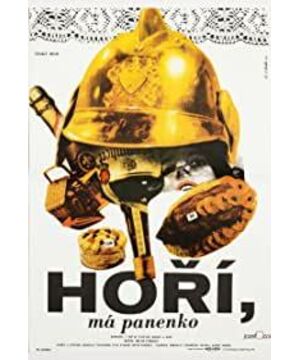Even if I die, I won't steal a piece of collectivism's fat... ah, it's delicious!
From dinner parties and group tours in large institutions, to group building and annual meetings in small companies, the party activities of each unit seem cheerful and relaxed to employees, but in fact, the test is no less than the execution of tasks. The members participating in the event are all Crouching Tiger, Hidden Dragon. You can't be casual to anyone, but you can't be tied, so your words and deeds in the event must be much more attentive than the ordinary gathering of relatives and friends. This is only the case for social gatherings involving fame and fortune, and even more so for activities that are mixed with political overtones.
In 1967, in Czechoslovakia, which was still a socialist country, a director turned a party with political interests into a movie. This director was Milos Foreman, who later went to Hollywood to film "One Flew Over the Cuckoo's Nest," "Mozart," and "Man on the Moon"; the film was called "The Firemen's Ball." In fact, as early as the 1960s, Milos Foreman was already a representative of the new wave of Czech films at that time, but due to the constraints of the Czech political environment at that time, he was repeatedly frustrated in creation. While Foreman was still working on the script, he and his friends attended a local firefighter's dance. After that, he was completely attracted by the theme, so he wrote a script based on the dance, and then used the Professional actor, made into a 70-minute low-budget light comedy film, this time the "Firemen's Ball".
Like Foreman's later Hollywood films, "The Firemen's Ball" is full of irony. But what he satirized was not only the weakness of human nature, but also the dead end of the system. In the opening chapter, due to the dispute between the organizers, the propaganda poster scene on the roof beam was burned down before it could be put out. It became the last scene before the title was released, and the teasing tendencies of the whole film were thus settled.
The scene of the next feature film is even more unexpected. The whole film is 70 minutes long, and it talks about the firemen's ball, but the allusions of every paragraph during the ball go beyond the ball itself. The first is the beauty pageant. Several decades-old fire brigade old men want to learn how to vote for Miss Capitalist countries, and ask the beauty pageant champion to present a prize to the former chairman of the fire department. However, the foundations of the emergence and development of beauty pageants are, first, the enlightenment of the system and economy, and second, the enlightenment of the masses' ideology and aesthetics. After years of ideological repression, the veteran cadres will only use the method of training soldiers to train (pull) the candidates for the election. Among the candidates, there is only a slightly bloated slut who has a sense of fashion. Other people attending the dance are either Extremely conservative, or extremely fanatical. In the end, everyone screwed up the pageant together. In the beauty pageant alone, the incompetence of the system represented by the fire station in terms of cohesion, appeal, and contemporary nature is evident.
It's not good to do fancy things. When the fire comes, put it out. Anyway, this is the job of firefighters. But what is sad and ridiculous is that the atmosphere of these veteran cadres' activities cannot be maintained, and the fire can't be extinguished. The fire has burned more than half of the house, and they have not rushed to shovel snow to put out the fire. The fire brigade, which was so beautiful in the past, has such a shameful efficiency at this time, and the propaganda posters deserved to be burned in vain! The masses also gave the system a lot of shame. Only the wife of an old cadre still thought of taking care of the old owner of the house, so that the old owner would not watch the house where he lived for most of his life being burned down. The old man felt cold and asked him to get closer to the fire to keep warm. The rest of the people watched the fun while drinking the wine they brought from the dance. The numbness is not necessarily caused by the institutional environment, but the corruption of the system will exacerbate the numbness of the masses. Under this premise, vulnerable individuals become victims.
The crazier is yet to come-the "lost prom prize" that runs through the whole film finally ushered in a climax. Since the ball has not even started, the prizes have been lost frequently. Everyone at the dance was suspected of stealing, but the people even made a "kind act" of donating lottery tickets for the old man whose house was burned down. In the face of repeated orders from the veteran cadres, no one came forward and admitted that he stole the prize. . On the contrary, the old cadre in charge of taking care of the prizes honestly helped his wife (the woman who kindly comforted the old owner of the house on fire during the fire, look, human nature is so complicated) to return the prizes in front of everyone, and inadvertently became the masses The fire department's target could be slammed at any time. The corruption of the system exacerbates the evil of the group, and also intensifies the contradictions and suspicions between the upper and lower levels. Among these farces, three are the most pitiful:
One is the former chairman of the fire department. The fire department dance was actually for his birthday. Although he suffers from cancer and speaks in a slightly official manner, judging from his peaceful personality and steady actions, he may have been a conscientious firefighter before his retirement. For the system, he is considered a good cadre. But in the end, even the prizes that belonged to him disappeared like those in the lottery. In the face of the consequences of the farce caused by the corruption of the system, he could only bear it silently.
One is an old man whose house has been burned down. Balls, prizes, beauty pageants, and even the birthday of the former chairman of the firefighters are all he can't care about, because the house he lives on is gone, so what's the mood to enjoy? For him, the lottery tickets donated by the masses participating in the dance are equivalent to "moving XX" to praise and sing praises to the poor groups, and they do not have much substantive effect. As for the issue of his living and living after the house was burnt down, no one seemed to intervene in the mutual tossing between the guests at the ball and the fire station. Not to mention action.
Another is the honest old cadre who is responsible for taking care of the prizes. He has always abide by his duties throughout the film, and even his wife complained that "everyone else is stealing, but you are still sticking to it". The veteran cadre returned the prize stolen by his wife out of duty, but he became the target of public criticism unintentionally. He was a thorn in the side of the fire department and the masses. In the end, as an honest man, like the homeless old man, he also became a lost dog in the corrupt system and chaotic order. In 1967, after the filming of the ridiculing "Firemen's Ball", the film was submitted to the jury according to the rules. This film angered the Czech Politburo Standing Committee, and "Firemen's Ball" was banned from being shown in the Czech Republic. The funny thing is, nothing else particularly serious happened. However, the film was co-produced with an Italian producer, and if he did not copy the film, he would have to pay back $65,000. The Italian producers wanted to make copies, and the Czech authorities could not pay the compensation. When Foreman was handing over power at home, Foreman sneaked the film to Paris. The film was favored by many French filmmakers, including Truffaut. Things were settled, Foreman was not charged with sabotaging the socialist economy, and he left the Czech Republic shortly after, which led to his later creative career in Hollywood. Now, the Czech Republic, which was originally a part of Czechoslovakia, has long since disintegrated with Slovakia and became an independent Czech Republic, which belongs to a capitalist country; and the "traitor of socialism" Milos Forman has become a master of characterization in the film industry. Later, in April of this year, I went to the West. And what about the Chinese cultural circles with similar systems? I'm afraid it will be annihilated in the vibrato-style aesthetic and moral kidnapping.
View more about The Firemen's Ball reviews








